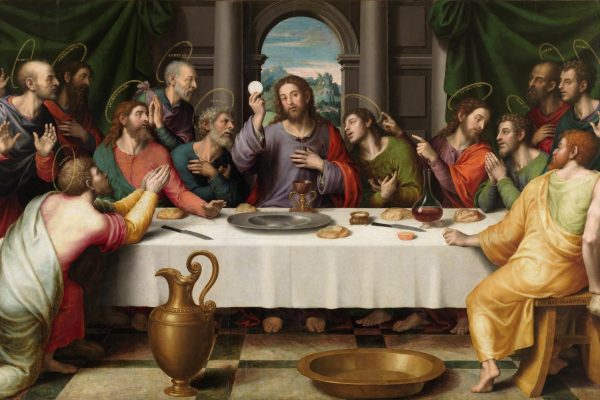Home>Bible Facts>Who Were All Of Jesus Apostles


Bible Facts
Who Were All Of Jesus Apostles
Published: February 22, 2024
Peter Smith, Editorial Director at Christian.net, combines deep insights into faith, politics, and culture to lead content creation that resonates widely. Awarded for his contributions to religious discourse, he previously headed a major organization for religious communicators, enhancing dialogue on faith's societal impacts.
Discover interesting facts about all of Jesus' apostles in the Bible. Learn about their lives, roles, and significance in Christian history. Explore the stories of the twelve disciples and their impact.
(Many of the links in this article redirect to a specific reviewed product. Your purchase of these products through affiliate links helps to generate commission for Christian.net, at no extra cost. Learn more)
Table of Contents
Introduction
The apostles of Jesus Christ were a group of twelve men who played a pivotal role in spreading the teachings of Christianity. These individuals were handpicked by Jesus himself and were witnesses to his miracles, teachings, crucifixion, and resurrection. Their unwavering dedication and commitment to sharing the gospel laid the foundation for the global faith that Christianity is today.
Each apostle had a unique background and set of experiences, which contributed to the diverse perspectives they brought to the ministry. Their collective mission was to proclaim the message of salvation, heal the sick, and cast out demons, all under the guidance of Jesus.
As we delve into the lives of these remarkable individuals, we will uncover their personal journeys, the impact they had on the early Christian community, and the enduring legacy they left behind. From Simon Peter, the outspoken leader of the apostles, to Judas Iscariot, whose betrayal led to the crucifixion of Jesus, each apostle's story is filled with triumphs, challenges, and profound lessons that continue to resonate with believers today.
Join us on a captivating exploration of the lives and contributions of these extraordinary men who were chosen to be the closest companions of Jesus Christ, the Son of God. Through their unwavering faith and dedication, they played an integral role in shaping the course of Christianity and inspiring countless individuals to embrace the message of love, redemption, and eternal life.
As we embark on this enlightening journey, we will gain a deeper understanding of the profound impact that the apostles had on the world and how their enduring legacy continues to shape the beliefs and practices of millions of Christians across the globe.
Read more: Who Were Jesus Apostles
Simon Peter
Simon Peter, originally known as Simon, was a prominent figure among Jesus' apostles. He was a fisherman by trade and resided in the town of Capernaum on the shores of the Sea of Galilee. Peter's given name was Simon, but Jesus bestowed upon him the name "Peter," which means "rock" in Greek, symbolizing the steadfastness and resilience that would come to define his character.
Peter's encounter with Jesus is a defining moment in his life. When Jesus called upon him and his brother Andrew to become "fishers of men," they immediately left their fishing nets and followed him. This pivotal decision marked the beginning of Peter's transformative journey as one of Jesus' closest companions and disciples.
Throughout the Gospels, Peter's passionate and impulsive nature is evident. He often acted as the spokesperson for the group, fearlessly expressing his thoughts and emotions. One of the most iconic moments in Peter's life is his bold attempt to walk on water towards Jesus during a stormy night on the Sea of Galilee. Although he briefly faltered due to doubt, his unwavering faith in Jesus allowed him to accomplish this miraculous feat.
Peter's unwavering loyalty to Jesus was also evident during the Last Supper when he vehemently declared that he would never betray his beloved teacher, even if all the other disciples did. However, as foretold by Jesus, Peter denied him three times following Jesus' arrest, leading to immense remorse and anguish on Peter's part.
After Jesus' resurrection, Peter played a crucial role in the early Christian community. He fearlessly preached the gospel, performed miracles, and demonstrated exceptional leadership qualities. His influential presence was felt during the Day of Pentecost when he delivered a powerful sermon, leading to the conversion of thousands.
Peter's enduring legacy extends beyond his unwavering faith and leadership. He is often remembered for his humility and willingness to learn from his mistakes. His transformation from a simple fisherman to a revered apostle serves as an inspiring example of God's ability to work through imperfect individuals to accomplish extraordinary feats.
In the annals of Christian history, Simon Peter's legacy remains indelible. His profound impact on the early church and his unwavering commitment to spreading the message of Jesus Christ continue to inspire believers worldwide. Peter's life exemplifies the transformative power of faith, forgiveness, and unwavering dedication to a higher calling. His story serves as a testament to the boundless grace and mercy of God, offering hope and encouragement to all who seek to follow in the footsteps of the rock upon which the Christian faith was built.
Andrew
Andrew, the brother of Simon Peter, was a pivotal figure among the apostles of Jesus Christ. Like his brother, Andrew was a fisherman by trade, and they both hailed from the town of Capernaum, situated along the shores of the Sea of Galilee. Andrew's life took a transformative turn when he encountered Jesus, marking the beginning of his extraordinary journey as one of the chosen disciples.
Andrew's introduction to Jesus is a testament to his receptive and open-hearted nature. Upon meeting Jesus, Andrew recognized him as the long-awaited Messiah and wasted no time in sharing this profound revelation with his brother, Simon Peter. This act of immediate evangelism underscores Andrew's deep faith and his eagerness to share the life-changing message of Jesus with those closest to him.
Throughout the Gospels, Andrew is often portrayed as a humble and faithful disciple who played a significant role in facilitating pivotal moments in Jesus' ministry. One notable instance is the miraculous feeding of the five thousand, where Andrew's willingness to bring a young boy with five barley loaves and two fish to Jesus paved the way for a profound demonstration of divine abundance and provision.
Andrew's unwavering commitment to spreading the gospel extended beyond the borders of Israel. His missionary endeavors took him to various regions, including Scythia and Greece, where he fearlessly proclaimed the message of salvation and the transformative power of Christ's love. His fervent dedication to sharing the good news with diverse communities exemplifies the universal nature of the gospel and the inclusivity of God's redemptive plan for all humanity.
Despite the limited spotlight in the Gospels, Andrew's impact on the early Christian community and his steadfast devotion to Jesus' teachings left an indelible mark on the foundation of the Christian faith. His selfless and humble demeanor, coupled with his unwavering commitment to sharing the message of salvation, serves as an enduring example for believers today.
Andrew's legacy transcends time, inspiring individuals to embrace a life of humility, evangelism, and unwavering faith. His pivotal role in the early spread of Christianity and his enduring influence on subsequent generations underscore the profound impact of a dedicated disciple who wholeheartedly embraced the call to follow Jesus. Andrew's life stands as a testament to the transformative power of faith and the profound impact that a humble and devoted servant of Christ can have on the world.
James, son of Zebedee
James, the son of Zebedee, was one of the twelve apostles chosen by Jesus Christ to accompany him during his earthly ministry. Alongside his brother John, James was part of the inner circle of disciples who shared intimate moments with Jesus, including the transfiguration and the agonizing hours in the Garden of Gethsemane. His close proximity to Jesus allowed him to witness firsthand the profound teachings, miracles, and sacrificial love of the Son of God.
James and his brother John were known for their fervent and zealous spirits, earning them the nickname "Sons of Thunder." This epithet reflects their passionate and bold nature, which occasionally manifested in their interactions with others. Despite their occasional impetuosity, James and John were deeply devoted to Jesus and wholeheartedly embraced his teachings.
One of the most significant events in James' life was his presence at the transfiguration, a divine manifestation where Jesus' appearance was transformed, and he was seen conversing with Moses and Elijah. This awe-inspiring experience left an indelible impression on James, reinforcing his belief in the divine nature of Jesus and the fulfillment of the prophecies concerning the Messiah.
As Jesus' ministry progressed, James and his brother expressed a desire to occupy positions of honor in the kingdom of God. However, Jesus humbly redirected their ambitions, emphasizing the servant-hearted nature of true discipleship. This encounter serves as a poignant reminder of the transformative power of Jesus' teachings, which challenged societal norms and redefined the principles of leadership and greatness.
James' unwavering commitment to Jesus was further evidenced by his willingness to endure persecution and suffering for the sake of the gospel. He became the first apostle to be martyred for his faith, a testament to his steadfast devotion to the message of Christ. His martyrdom serves as a poignant reminder of the sacrifices made by early followers of Jesus and the enduring legacy of those who fearlessly proclaimed the gospel in the face of adversity.
The life of James, son of Zebedee, exemplifies the profound impact of wholehearted devotion to Jesus Christ. His journey from a zealous disciple to a martyr for the faith underscores the transformative power of encountering the living God. James' legacy continues to inspire believers to embrace a life of unwavering faith, sacrificial love, and courageous proclamation of the gospel, even in the face of opposition and persecution.
Through his remarkable example, James invites us to consider the depth of our commitment to the teachings of Jesus and the extent to which we are willing to embody the selfless love and unwavering faith that characterized his life. His enduring influence serves as a timeless reminder of the profound impact that a dedicated follower of Christ can have on the world, leaving an indelible mark on the fabric of Christian history and inspiring generations to embrace the transformative message of the gospel.
John
John, often referred to as the beloved disciple, holds a unique and revered position among the apostles of Jesus Christ. His profound intimacy with Jesus and his unparalleled insights into the divine nature of the Son of God distinguish him as a central figure in the narrative of the Gospels. As the author of the Gospel of John, three epistles, and the book of Revelation, his contributions to the New Testament canon are invaluable, providing profound theological depth and spiritual nourishment for believers throughout the ages.
John's journey as an apostle was marked by a deep and abiding love for Jesus, which permeated his interactions, writings, and ministry. His close relationship with Jesus afforded him unparalleled access to the heart and teachings of the Messiah, allowing him to convey profound truths about the nature of Christ's divinity, sacrificial love, and redemptive mission.
One of the most poignant moments in John's life was his presence at the crucifixion, where Jesus entrusted the care of his mother, Mary, to him. This act of profound trust and filial responsibility underscored the depth of the bond between John and Jesus, highlighting John's unwavering commitment to fulfilling the Savior's wishes even amidst the anguish of witnessing the crucifixion.
John's Gospel stands as a testament to his deep theological insights and his desire to convey the profound truths about Jesus' identity as the Word made flesh, the light of the world, and the embodiment of divine love. His writings reflect a deep understanding of the spiritual significance of Jesus' life, teachings, death, and resurrection, offering readers a compelling invitation to embrace the transformative message of the gospel.
Following Jesus' resurrection and ascension, John played a pivotal role in the early Christian community, fearlessly proclaiming the message of salvation and nurturing the fledgling church. His enduring legacy as a spiritual leader and mentor is evident in his pastoral epistles, where he exhorts believers to walk in truth, love one another, and remain steadfast in their faith amidst the challenges of the world.
John's profound influence on the early church and subsequent generations is a testament to the enduring impact of a life wholly surrendered to the cause of Christ. His unwavering commitment to sharing the message of Jesus' redemptive love, coupled with his profound theological insights, continues to inspire believers to embrace a life of intimate communion with the Savior and to bear witness to the transformative power of the gospel.
In the annals of Christian history, John's life stands as a radiant testament to the profound impact of a disciple who wholeheartedly embraced the call to follow Jesus. His enduring influence serves as a timeless reminder of the transformative power of encountering the living God, leaving an indelible mark on the fabric of Christian history and inspiring generations to embrace the transformative message of the gospel.
Read more: Who Were The Super Apostles
Philip
Philip, one of the twelve apostles chosen by Jesus Christ, played a significant role in the ministry and spread of the gospel. His journey as a disciple was marked by unwavering dedication, a heart for evangelism, and a deep desire to introduce others to the transformative message of Jesus Christ.
Philip's encounter with Jesus is recorded in the Gospel of John, where he responded to the call to follow Jesus with immediacy and wholehearted commitment. His fervent faith and willingness to embrace the teachings of Jesus positioned him as a key figure among the apostles, contributing to the diverse tapestry of personalities and strengths within the group.
One of the most notable accounts of Philip's involvement in Jesus' ministry is his pivotal role in the miraculous feeding of the five thousand. When faced with the daunting task of providing food for the large crowd, Philip's practical mindset led him to assess the situation based on human limitations. However, Jesus used this circumstance to demonstrate his divine power and abundance, turning a meager offering into an extravagant display of provision and generosity.
Philip's unwavering commitment to sharing the gospel extended beyond the borders of Israel, as he became a bridge for the Gentiles to encounter the transformative message of Jesus Christ. His encounter with the Ethiopian eunuch, as documented in the book of Acts, exemplifies his heart for evangelism and his willingness to engage with individuals from diverse cultural backgrounds, ultimately leading to the eunuch's baptism and conversion.
As a disciple, Philip's steadfast faith and commitment to the mission of Jesus Christ left an indelible mark on the early Christian community. His willingness to engage with individuals from various cultural and social backgrounds underscores the universal nature of the gospel and the inclusive invitation to all people to experience the redemptive love of Christ.
Philip's enduring legacy serves as a compelling reminder of the transformative power of faith and the profound impact of dedicated discipleship. His life exemplifies the unwavering commitment to sharing the message of Jesus Christ with diverse communities, transcending barriers and inviting individuals from all walks of life to embrace the life-changing message of salvation.
In the annals of Christian history, Philip's life stands as a testament to the profound impact of a disciple who wholeheartedly embraced the call to follow Jesus. His enduring influence continues to inspire believers to embody a spirit of evangelism, inclusivity, and unwavering faith, leaving an indelible mark on the fabric of Christian history and inspiring generations to embrace the transformative message of the gospel.
Bartholomew
Bartholomew, also known as Nathanael, was a significant figure among the apostles of Jesus Christ. His journey as a disciple was characterized by unwavering faith, intellectual curiosity, and a profound encounter with the Son of God. While the Gospels provide limited details about Bartholomew's life, his impact on the early Christian community and his enduring legacy are testaments to the transformative power of encountering Jesus Christ.
Bartholomew's introduction to Jesus is chronicled in the Gospel of John, where he is initially brought to Jesus by Philip. Upon meeting Jesus, Bartholomew expressed skepticism, questioning whether anything good could come from Nazareth. However, his encounter with Jesus quickly dispelled his doubts, as Jesus astutely perceived Bartholomew's character, declaring him to be a man of integrity and devoid of deceit. This profound revelation left Bartholomew in awe, prompting him to acknowledge Jesus as the Son of God and the King of Israel.
Throughout his time as a disciple, Bartholomew's intellectual curiosity and steadfast faith positioned him as a valuable member of the apostolic circle. His willingness to engage in thoughtful discourse and his unwavering commitment to embracing the truth of Jesus' identity contributed to the diverse dynamics within the group of disciples.
Bartholomew's enduring legacy extends beyond his interactions with Jesus and the apostolic community. Following Jesus' ascension, Bartholomew fearlessly proclaimed the gospel, venturing to various regions to share the transformative message of salvation. His missionary endeavors took him to distant lands, including Armenia and India, where he fearlessly proclaimed the message of Christ's redemptive love and the hope found in the gospel.
The impact of Bartholomew's ministry is evidenced by the enduring presence of Christianity in the regions he visited, as well as the enduring legacy of faith and devotion among believers who trace their spiritual heritage to his evangelistic efforts. His unwavering commitment to sharing the gospel with diverse communities underscores the universal nature of the message of Jesus Christ and the inclusive invitation to all people to experience the transformative power of faith.
In the annals of Christian history, Bartholomew's life stands as a radiant testament to the profound impact of a disciple who wholeheartedly embraced the call to follow Jesus. His enduring influence serves as a timeless reminder of the transformative power of encountering the living God, leaving an indelible mark on the fabric of Christian history and inspiring generations to embrace the transformative message of the gospel.
Matthew
Matthew, also known as Levi, was a tax collector before he was called by Jesus to become one of his twelve apostles. His encounter with Jesus and subsequent decision to follow him marked the beginning of a transformative journey that would profoundly impact the early Christian community and the course of Christian history.
As a tax collector, Matthew was often viewed with disdain and suspicion by his fellow Jews, as tax collectors were associated with collaboration with the Roman authorities and were perceived as traitors to their own people. However, Jesus saw beyond Matthew's societal label and recognized the potential for profound transformation within him. When Jesus extended the invitation to follow him, Matthew responded with immediate obedience, leaving behind his life as a tax collector to embrace a new calling as a disciple of the Son of God.
Matthew's Gospel stands as a testament to his meticulous attention to detail and his desire to convey the life, teachings, and redemptive mission of Jesus Christ with clarity and purpose. His Gospel account provides a comprehensive narrative of Jesus' genealogy, teachings, miracles, and ultimate sacrifice, offering readers a profound insight into the identity and significance of the Messiah.
Following Jesus' resurrection and ascension, Matthew played a pivotal role in the early Christian community, fearlessly proclaiming the message of salvation and nurturing the fledgling church. His Gospel account, written with a primarily Jewish audience in mind, served as a bridge between the rich tapestry of Jewish history, prophecy, and the fulfillment found in the person of Jesus Christ.
Matthew's enduring legacy as an apostle and Gospel writer continues to inspire believers to embrace a life of unwavering faith, sacrificial love, and courageous proclamation of the gospel. His transformation from a tax collector to a devoted follower of Jesus serves as a powerful example of the redemptive and transformative power of encountering the living God.
In the annals of Christian history, Matthew's life stands as a radiant testament to the profound impact of a disciple who wholeheartedly embraced the call to follow Jesus. His enduring influence serves as a timeless reminder of the transformative power of encountering the living God, leaving an indelible mark on the fabric of Christian history and inspiring generations to embrace the transformative message of the gospel.
Thomas
Thomas, also known as Didymus, holds a distinctive place among the apostles of Jesus Christ. His journey as a disciple was marked by a profound encounter with doubt and a transformative revelation that continues to resonate with believers today. Thomas' initial skepticism following Jesus' resurrection serves as a poignant reminder of the human struggle with faith and the redemptive power of encountering the risen Savior.
Thomas' most notable moment in the Gospels is his reaction to the news of Jesus' resurrection. When the other disciples joyfully proclaimed that they had seen the risen Lord, Thomas expressed skepticism, stating that he would only believe if he could physically touch the wounds of Jesus. This moment of doubt has led to Thomas being commonly referred to as "Doubting Thomas." However, his honest expression of uncertainty provides a relatable glimpse into the human struggle with faith and the need for tangible evidence in the face of profound claims.
Despite his initial skepticism, Thomas' encounter with Jesus serves as a transformative turning point in his journey as a disciple. When Jesus appeared to the disciples a week later, he specifically addressed Thomas' doubts, inviting him to touch his wounds and see for himself. In that moment, Thomas's doubt was transformed into unwavering conviction as he proclaimed, "My Lord and my God!" This profound declaration encapsulates the transformative power of encountering the resurrected Christ and the profound impact it had on Thomas' faith.
Thomas' journey from doubt to unwavering belief serves as a compelling testament to the redemptive nature of encountering the living God. His honest expression of doubt and subsequent transformation into a steadfast believer offers hope and encouragement to individuals grappling with their own uncertainties. Thomas' story reminds believers that doubt does not disqualify one from experiencing the transformative power of faith and encountering the living Christ in a deeply personal and profound manner.
Following this transformative encounter, Thomas played a pivotal role in the early Christian community, fearlessly proclaiming the message of Jesus' resurrection and the transformative power of encountering the risen Savior. His enduring legacy as a devoted disciple who grappled with doubt and emerged with unwavering faith continues to inspire believers to embrace a life of honest inquiry, unwavering conviction, and courageous proclamation of the gospel.
In the annals of Christian history, Thomas' life stands as a radiant testament to the profound impact of a disciple who wholeheartedly embraced the call to follow Jesus. His enduring influence serves as a timeless reminder of the transformative power of encountering the living God, leaving an indelible mark on the fabric of Christian history and inspiring generations to embrace the transformative message of the gospel.
Read more: Who Were The Successors Of The Apostles
James, son of Alphaeus
James, son of Alphaeus, is one of the lesser-known apostles of Jesus Christ, often overshadowed by his namesake, James the son of Zebedee. Despite the limited details about his life in the Gospels, James played a significant role in the early Christian community and contributed to the foundational framework of the faith.
As one of the twelve apostles chosen by Jesus, James embraced the call to follow the Son of God and embarked on a transformative journey that would shape the course of his life. His steadfast commitment to Jesus and the teachings he imparted positioned him as a vital figure within the apostolic circle, contributing to the diverse tapestry of personalities and strengths among the disciples.
James' unwavering dedication to the ministry of Jesus is evidenced by his presence during pivotal moments in the Savior's earthly journey. His intimate proximity to Jesus allowed him to witness the profound teachings, miracles, and sacrificial love of the Son of God, shaping his understanding of the transformative message that Jesus embodied.
Following Jesus' resurrection and ascension, James continued to play a crucial role in the early Christian community, fearlessly proclaiming the message of salvation and nurturing the fledgling church. His enduring legacy as a devoted disciple who wholeheartedly embraced the call to follow Jesus serves as a timeless reminder of the transformative power of encountering the living God.
James' life exemplifies the profound impact of unwavering faith and dedicated discipleship, transcending the limitations of historical documentation to inspire believers to embrace a life of steadfast commitment to the teachings of Jesus Christ. His enduring influence continues to resonate with individuals seeking to deepen their understanding of the transformative message of the gospel and the profound impact of encountering the risen Savior.
In the annals of Christian history, James, son of Alphaeus, stands as a radiant testament to the profound impact of a disciple who wholeheartedly embraced the call to follow Jesus. His enduring influence serves as a timeless reminder of the transformative power of encountering the living God, leaving an indelible mark on the fabric of Christian history and inspiring generations to embrace the transformative message of the gospel.
Thaddaeus
Thaddaeus, also known as Lebbaeus or Judas, holds a significant place among the apostles of Jesus Christ, despite the limited details about his life in the Gospels. His unwavering commitment to the ministry of Jesus and the transformative impact of encountering the Son of God positioned him as a vital figure within the apostolic circle, contributing to the diverse tapestry of personalities and strengths among the disciples.
Thaddaeus' journey as a disciple was marked by a deep and abiding love for Jesus, which permeated his interactions, ministry, and unwavering dedication to the teachings of the Messiah. His steadfast commitment to Jesus and the message of salvation exemplified the transformative power of encountering the living God and the profound impact it had on his life and ministry.
Despite the limited spotlight in the Gospels, Thaddaeus' impact on the early Christian community and his enduring legacy are testaments to the transformative power of encountering Jesus Christ. His unwavering commitment to sharing the gospel and nurturing the fledgling church continues to inspire believers to embrace a life of unwavering faith, sacrificial love, and courageous proclamation of the gospel.
Thaddaeus' life exemplifies the profound impact of dedicated discipleship, transcending the limitations of historical documentation to inspire believers to embrace a life of steadfast commitment to the teachings of Jesus Christ. His enduring influence continues to resonate with individuals seeking to deepen their understanding of the transformative message of the gospel and the profound impact of encountering the risen Savior.
In the annals of Christian history, Thaddaeus stands as a radiant testament to the profound impact of a disciple who wholeheartedly embraced the call to follow Jesus. His enduring influence serves as a timeless reminder of the transformative power of encountering the living God, leaving an indelible mark on the fabric of Christian history and inspiring generations to embrace the transformative message of the gospel.
Simon the Zealot
Simon the Zealot, also known as Simon the Cananaean, occupies a distinctive place among the apostles of Jesus Christ. His association with the term "Zealot" has sparked scholarly debate, with some interpretations suggesting that he may have been affiliated with the Zealot movement, a group known for their fervent opposition to Roman rule. This potential background adds a layer of complexity to Simon's identity and underscores the diverse backgrounds and perspectives represented among the chosen disciples.
Simon's journey as a disciple was marked by a deep and unwavering commitment to the teachings of Jesus Christ. His encounter with the Son of God and subsequent decision to follow him exemplify the transformative power of encountering the living God. Despite the potential implications of his association with the Zealot movement, Simon's dedication to Jesus transcended political affiliations, reflecting a profound recognition of the redemptive message and transformative impact of the Savior's ministry.
As one of the twelve apostles chosen by Jesus, Simon played a pivotal role in the ministry and spread of the gospel. His unwavering commitment to the teachings of Jesus and the message of salvation positioned him as a vital figure within the apostolic circle, contributing to the diverse tapestry of personalities and strengths among the disciples. Simon's fervent dedication to the mission of Jesus Christ underscores the universal nature of the gospel and the inclusive invitation to all people to experience the transformative power of faith.
Despite the limited details about his life in the Gospels, Simon's impact on the early Christian community and his enduring legacy are testaments to the transformative power of encountering Jesus Christ. His unwavering commitment to sharing the gospel and nurturing the fledgling church continues to inspire believers to embrace a life of unwavering faith, sacrificial love, and courageous proclamation of the gospel.
In the annals of Christian history, Simon the Zealot stands as a radiant testament to the profound impact of a disciple who wholeheartedly embraced the call to follow Jesus. His enduring influence serves as a timeless reminder of the transformative power of encountering the living God, leaving an indelible mark on the fabric of Christian history and inspiring generations to embrace the transformative message of the gospel.
Judas Iscariot
Judas Iscariot, a name synonymous with betrayal, occupies a complex and somber place among the apostles of Jesus Christ. His role in the narrative of the Gospels is marked by the profound tragedy of betrayal, a fateful act that reverberates through the annals of Christian history. Judas' journey as a disciple is a poignant reminder of the complexities of human nature, the consequences of moral choices, and the enduring impact of his actions on the course of Christianity.
As one of the twelve chosen apostles, Judas walked alongside Jesus, witnessing his miracles, teachings, and profound acts of compassion. His proximity to the Son of God positioned him as a central figure in the unfolding drama of Jesus' ministry, offering a unique vantage point into the transformative message and redemptive mission of the Savior. However, despite this intimate association, Judas' heart became ensnared by greed and disillusionment, leading to a tragic betrayal that would alter the course of history.
The account of Judas' betrayal stands as a sobering reminder of the frailty of human resolve and the devastating consequences of succumbing to the allure of worldly gain. His decision to betray Jesus for thirty pieces of silver stands as a cautionary tale, illustrating the corrosive nature of greed and the profound impact of moral compromise on the fabric of relationships and trust.
Judas' betrayal, culminating in the infamous kiss of betrayal in the Garden of Gethsemane, set in motion the chain of events that led to Jesus' arrest, trial, and crucifixion. The weight of his actions reverberates through the ages, serving as a poignant reminder of the profound consequences of betrayal and the enduring legacy of his fateful decision.
Despite the tragic nature of Judas' role in the narrative of the Gospels, his story serves as a sobering reminder of the complexities of human nature and the enduring impact of moral choices. His life stands as a cautionary tale, prompting reflection on the enduring consequences of betrayal and the transformative power of redemption and forgiveness.
In the annals of Christian history, Judas Iscariot's legacy serves as a poignant reminder of the enduring impact of moral choices and the profound consequences of betrayal. His tragic role in the narrative of the Gospels underscores the complexities of human nature and the enduring lessons that continue to resonate with believers, offering a sobering reminder of the enduring impact of moral choices and the transformative power of redemption and forgiveness.













